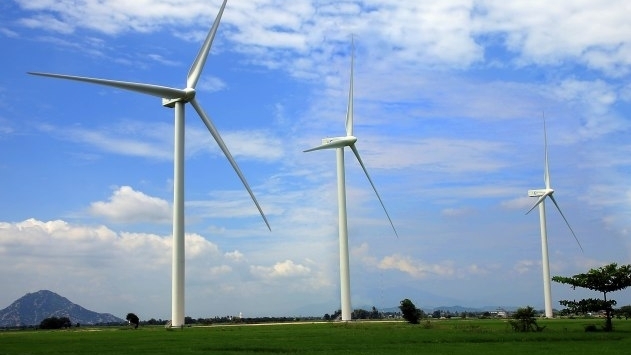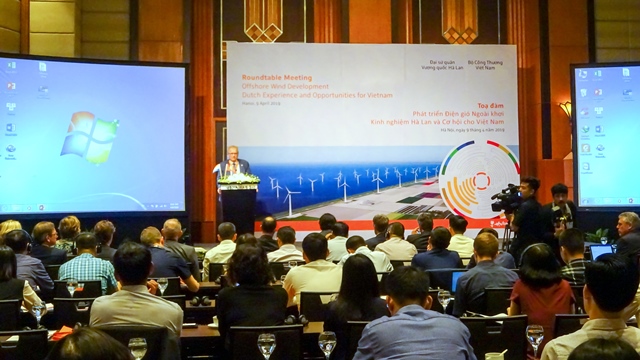
Vietnam has huge potential for offshore wind power production. (Photo for illustration: NDO/Nguyen Trung)
The assessment was provided at a roundtable discussion on the development of offshore wind power in Vietnam with Dutch experience, held by the Dutch Embassy in Vietnam in collaboration with the Vietnamese Ministry of Industry and Trade (MoIT) in Hanoi on April 9.
Speaking at the event, Do Duc Quan, Deputy Head of the MoIT’s Electricity and Renewable Energy Authority, said that the demand for energy in Vietnam, especially electricity during 2020-2030, would be huge, as energy demand is increasing, while energy supply is and will be facing challenges, amidst traditional energy sources such as hydropower, coal, oil and gas that are gradually depleted and difficult to develop.
In such context, considering the exploitation of renewable energy sources, the Vietnamese government aims to produce 10.7% of electricity from renewable sources by 2030. It targets that the total wind power capacity will reach about 1,000 MW by 2020 and 6,200 MW by 2030.
Currently, Vietnam’s total installed wind power capacity is about 190MW, with four wind farms onshore and near shore with a capacity of 6 MW to 100 MW each, while an additional of 263 MW of wind power is under construction and 412 MW is in the process of appraisal approval. Approximately 4,236 MW have been approved, raising the total registered wind power capacity to 10,729 MW.

Delegates at the event share opportunities and challenges in developing offshore wind power in Vietnam with Dutch partners. (Photo: NDO/Dieu Ha)
With great advantages in wind power, especially the sea area from Quy Nhon city, in Binh Dinh province, to HCM City, offshore wind energy in Vietnam has yet been fully exploited. Meanwhile, the Netherlands is one of the top five countries in the world in research and development of offshore energy. The Dutch experience would be useful to Vietnam in selecting the optimal solution for the development of offshore wind power in the most appropriate way, Quan emphasised.
Praising the wind power potential in Vietnam, Hans De Boer, President of the Confederation of Netherlands Industry and Employers, said that large-scale offshore wind projects are an opportunity to reduce pressure in the power system. The Netherlands can share its experiences, knowledge and skills to study the design and construction of offshore wind power stations in Vietnam, he affirmed.
At the event, representatives from over 80 Vietnamese and Dutch companies, as well as experts in the field from both sides, provided relevant content on the recently updated legal framework and related requirements for offshore wind in Vietnam. They also discussed insights on the Dutch experience in the offshore wind power network, supply chain and technology.
The Dutch delegation will be in Hanoi and Ho Chi Minh City until April 12 to exchange with the Vietnamese partners in the field to share information and seek cooperation opportunities.
This series of events is part of the Memorandum of Understanding (MoU) signed in 2011 on energy cooperation between the MoIT and the Dutch Ministry of Economic Affairs, Agriculture and Innovation at that time. Within the MoU, the two sides agreed to promote cooperation between government agencies, companies, institutes and other organisations from both sides in the field of wind energy, with the aim of sharing knowledge, experience, data and best practices related to wind power development./.
NDO/Recorded by LAO
 Da Nang invests over 200 billion VND in semiconductor chip design, AI development
Da Nang invests over 200 billion VND in semiconductor chip design, AI development




